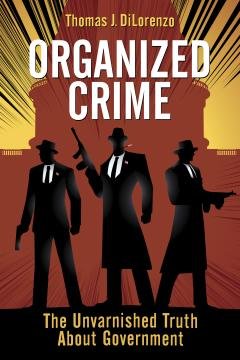LIBERTARIAN BOOK CLUB: Organized Crime-The Unvarnished Truth About Government by Thomas DiLorenzo

We are a monthly book club for anyone who wants to learn more about Libertarianism. We will discuss each book's chapter/section in separate posts, so everyone will be able to read along at their own pace. We typically also focus on books which are available for free so that everyone can participate. Join the Private Facebook Group and follow us on Twitter as we seek to learn more about Libertarianism.
Other books we've reviewed can be found here.

Organized Crime: The Unvarnished Truth About Government by Thomas DiLorenzo
Located here for free. Politics and thieves, coercion and regulation, fascism and the Fed, centralization and liberty, workers and unions, trade and freedom, free-market achievements and government disasters in American history — this book covers it all!
Section 1: Coercion and Regulation
I thought his synopsis and examples from Forty Centuries of Wage and Price Control: How NOT to Fight Inflation was solid. I’ll be adding it to my reading list. Unfortunately, no Audiobook version ☹
The “DiLorenzo’s Laws of Government” are pretty solid. I’ll need to expound on them later in a longer article and have them somewhere where I can share them easier when I’m arguing with people who want bigger government. They resounded with me as I think they will with others.
- DiLorenzo’s First Law of Government- In government, failure is success. Welfare Bureaucracy, Government Schools, NASA tragedies and the Federal Reserve, etc.
- DiLorenzo’s Second Law of Government- Politicians will rarely, if ever, assume responsibility for any of the problems that they cause with bad policies.
- DiLorenzo’s Third Law of Government- With few exceptions, politicians are habitual liars.
- DiLorenzo’s Fourth Law of Government- Politicians will only take the advice of their legions of academic advisers if the advice promises to increase the state’s power, wealth, and influence even if the politicians know that the advice is bad for the rest of society.
I also agreed that the price control section was timely after the debate we just endured following Hurricane Irma. I've written EXTENSIVELY about it here on my Steemit blog. How is it that The Continental Congress wisely adopted an anti-price control resolution on June 4, 1778 but it's still up for debate the negative effects?
That Resolution read:
“Whereas it hath been found by experience that limitations upon the prices of commodities are not only ineffectual for the purpose proposed, but likewise productive of very evil consequences—resolved, that it be recommended to the several states to repeal or suspend all laws limiting, regulating or restraining the price of any Article.”
If they knew price controls always failed 240 years ago, why is it even a question today? I blame education, or lack thereof.
Chapter 3 Who Will Regulate the Regulators
The logic on ‘providing more power to the Fed in order to prevent another Great Recession” was spot on:
“One of the biggest governmental lies is that financial markets are unregulated and in dire need of more central planning by government. Laissez-faire is said to have caused the “Great Recession.” Fed bureaucrats have lobbied for some kind of Super Regulatory Authority to supposedly remedy this problem. Th is is all a lie because according to one of the Fed’s own publications (“The Federal Reserve System: Purposes and Functions”), the Fed already has “supervisory and regulatory authority” over the following partial list of activities: bank holding companies, state-chartered banks, foreign branches of member banks, edge and agreement corporations, U.S. state-licensed bank branches, agencies and representative offices of foreign banks, nonbanking activities of foreign banks, national banks, savings banks, nonbank subsidiaries of bank holding companies, thrift holding companies, financial reporting procedures of banks, accounting policies of banks, business “continuity” in case of economic emergencies, consumer protection laws, securities dealings of banks, information technology used by banks, foreign investment by banks, foreign lending by banks, branch banking, bank mergers and acquisitions, who may own a bank, capital “adequacy standards,” extensions of credit for the purchase of securities, equal opportunity lending, mortgage disclosure information, reserve requirements, electronic funds transfers, interbank liabilities, Community Reinvestment Act sub-prime lending “demands,” all international banking operations, consumer leasing, privacy of consumer financial information, payments on demand deposits, “fair credit” reporting, transactions between member banks and their affiliates, truth in lending, and truth in savings.”

I had never heard of the non-profit libertarian think tank Competitive Enterprise Institute nor its annual product Ten Thousand Commandments: An Annual Snapshot of the Federal Regulatory State. It outlines the annual effect of regulations on business in the United States. Just checking out the fact sheet was valuable.
As someone who thinks government spending and the national debt are keystone issues of our time, I also want to check out Underground Government: The Off-Budget Public Sector, his book written with James Bennett in 1983. Maybe we can get that book into the hopper for the Book Club!

Chapter 5: Our Totalitarian Regulatory Bureaucracy
“In chapter 5 of F.A. Hayek’s 1944 classic, Th e Road to Serfdom, the Nobel laureate warned that the state need not directly control all or even most of the means of production to exert totalitarian control over the economic life of a nation. He cited the example of Germany where, as of 1928, “the central and local authorities directly control 53 percent” of the German economy. In addition to this, wrote Hayek, private industry in Germany was so heavily regulated that the state indirectly controlled “almost the whole economic life of the nation.” It was through such totalitarian controls that Germany traveled down “the road to serfdom.” As Hayek further stated, “there is, then scarcely an individual end which is not dependent for its achievement on the action of the state, and the ‘social scale of values’ which guides the state’s action must embrace practically all individual ends.” In other words, government regulation was so pervasive that the pursuit of profit, driven by consumer preferences, was mostly replaced by the whims of regulatory bureaucrats.”
MORE to come as we finish this book. Catch the full review and other books over at [http://www.libertylol.com/libertarianbc.html).

libertyLOL's "Divide and Rule"
If you enjoyed, Please Upvote, Follow and Resteem!
Follow libertyLOL on your favorite sites:
Steemit blog
Facebook
Twitter
Reddit
Youtube
Tumblr
Instagram
Pintrest
Countable: Government Made Simple
Patreon
Gab.ai
libertyLOL's Liberty Blog RSS Feed
We also run a couple twitterbots which provide great quotes, podcasts and book suggestions:
Liberty Podcasts
Murray Rothbard Suggests
Tom Woods Suggests
Jason Stapleton Suggests
Progressive Contradictions

This is an awesome idea! I am very interested to read this book; thanks for sharing it with us!
Tom Woods & Tom DiLorenzo
= Libertarian BAMFs
https://steemit.com/blog/@lucylin/patriot-wargamer-is-back-and-reloaded
hi there Everyone - I have had major problems this last week or so - So this my new account I am now using.
Have to start from scratch again - your support would be greatly appreciated -I am contacting all my followers to let you know.
I will be reposting all my best posts here, in the hope of getting things back as they were for me.
I hope you will be refollowing me - as I wil be, to all my new friends I found over the last 3/4 weeks.
If anyone knows cheetah, tell him to lay off any plagiarism accusations! lol
Cheers PW
Thomas DiLorenzo is a fantastic speaker, so his books ought to be good as well. I'll have to add this one to my little liberty library.
It's pretty solid. And the audiobook is FREE on the mises link!
Well now I have no excuse!